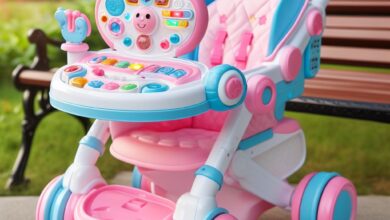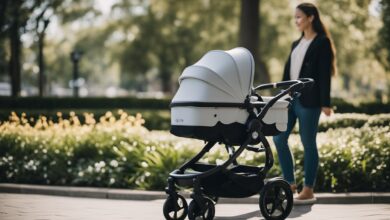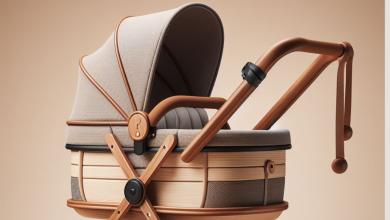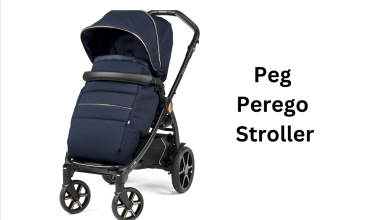Jewish Baby Stroller: Types, Features, Benefits & More
You Need To See It If You Are A Jews

Jewish baby stroller is also known as “kosher stroller” or “Shabbat stroller”. It represents a thoughtful intersection of tradition and modern parenting. The design accommodates the unique needs of observant Jewish families.
These strollers go beyond conventional models by incorporating features that adhere to religious customs. In this article, you will get to know the various types, distinctive features, and the benefits that these strollers bring to Jewish families. Let’s slide down to the main details.
What is Jewish Baby Stroller?
A Jewish baby stroller is a specialized baby carriage designed to meet the unique needs of observant Jewish families. It is particularly useful for those who adhere to traditional Jewish laws and customs. These strollers are crafted to enhance the observance of Shabbat, the Jewish day of rest, and other religious practices.
One distinctive feature of a Jewish baby stroller is its compliance with the laws of muktzeh, which prohibit the handling of certain objects on Shabbat. These strollers are engineered to be easily maneuvered without violating these restrictions.
Additionally, Jewish baby stroller often incorporates design elements to accommodate specific rituals, such as the use of a tallit (prayer shawl) as a canopy to provide shade. The strollers may also include pockets for storing prayer books or other religious items.
Types of Jewish Baby Strollers
Jewish baby stroller is specially tailored for Jewish families. It comes in various types designed to align with religious customs and practices. These specialized strollers assist to the diverse rituals and laws observed within the Jewish community.
Shabbat Strollers:
Shabbat strollers are specifically crafted to adhere to the laws of muktzeh, which prohibit handling certain objects on the Jewish day of rest. It is called Shabbat. These strollers ensure that parents can transport their infants without violating these religious restrictions.
Canopy Strollers:
Some Jewish baby strollers feature canopies designed to resemble a tallit, a traditional Jewish prayer shawl. These canopies provide shade for the child and integrate a symbolic element into the stroller design.
Sabbath-Friendly Accessories:
Certain strollers come equipped with pockets and compartments designed to store prayer books, religious items, or even a kiddush cup. It enables families to seamlessly incorporate their religious practices into their daily stroller use.
Traditional Vs. Modern Jewish Baby Strollers
Jewish baby strollers have evolved over time with a noticeable distinction between traditional and modern designs. Traditional strollers are more close to religious customs.
But modern counterparts aim to balance functionality with adherence to Jewish laws. This comparison highlights the unique features and considerations that distinguish these two categories of strollers.
Design and Aesthetics:
Traditional: Traditional Jewish baby strollers often feature symbolic elements. The design may prioritize adherence to cultural norms over contemporary aesthetics.
Modern: Modern strollers embrace sleek designs and versatile color palettes. It offers a more contemporary appearance. While functionality remains a priority, modern strollers may incorporate subtle nods to tradition without compromising on style.
Technological Advancements:
Traditional: Traditional strollers typically maintain a more straightforward design with manual mechanisms for folding and unfolding. Technological complexities are often minimized to prioritize religious laws.
Modern: In contrast, modern Jewish baby strollers leverage technological advancements. You can take example of one-handed folding mechanisms, adjustable canopies with UV protection, and ergonomic features to enhance the overall user experience.
| Feature | Traditional Strollers | Modern Strollers |
| Design | Symbolic and culturally rich | Sleek and contemporary |
| Technological Advancements | Minimal | Advanced features and design |
| Religious Customs Importance | High | Balanced with modern trends |
Features of Jewish Baby Stroller
Jewish baby stroller is designed to accommodate the specific needs of observant Jewish families. It comes equipped with distinctive features that cater to religious customs and practices. These strollers prioritize functionality and follow Jewish laws and traditions.
Muktzeh Compliance:
A paramount feature of Jewish baby strollers is their adherence to the laws of Muktzeh. These strollers are meticulously designed to allow for easy maneuverability on Shabbat without violating the prohibition on handling certain objects.
Canopy Symbolism:
Many Jewish baby strollers feature canopies designed to resemble a Tallit (traditional Jewish prayer shawl). This provides shade for the child and integrates a symbolic element into the stroller design.
Sabbath-Friendly:
Some strollers come with purpose-built pockets and compartments to store prayer books, religious items, or a kiddush cup. These thoughtful additions enable families to seamlessly incorporate their religious practices into everyday activities.
Easy Folding Mechanisms:
Jewish baby strollers often boast easy folding mechanisms. This feature aligns with the goal of facilitating convenience for parents. It allows them to navigate various settings while adhering to Jewish laws.
Can you customize a Jewish baby stroller?
Customizing a Jewish baby stroller is a growing trend that allows observant Jewish families to blend tradition with personal preferences. You can create a stroller that meets both religious and aesthetic requirements.
Customization often includes the option to choose or design a canopy that holds symbolic significance. Families may opt for personalized patterns or colors that resonate with their cultural or religious heritage.
Some families choose to add embroidered elements to the stroller fabric. This allows for a personal touch while maintaining the overall cultural integrity of the stroller. While adhering to the essential features required by Jewish laws, families can often select from a range of colors and materials.
Besides, customizations may extend to practical additions like extra storage pockets, cup holders, or unique accessories. These modifications enhance the functionality of the stroller, and fulfill the specific needs of the family.
Benefits of Using Jewish Baby Strollers
Jewish baby strollers provide families with a range of benefits that seamlessly integrate religious practices into their daily lives. These specialized strollers offer a combination of practical features and adherence to Jewish laws. It makes them a valuable asset for families navigating the intersection of tradition and modern parenting.
Blending with Religious Laws:
The primary benefit lies in the meticulous design that ensures compliance with Jewish laws. It is particularly those related to the observance of Shabbat and muktzeh. The strollers enable parents to transport their infants comfortably without violating religious restrictions.
Seamless Integration of Tradition:
Jewish baby strollers seamlessly integrate symbolic elements, such as canopies resembling a tallit, into their design. This integration allows families to instill cultural and religious values in their children from an early age.
Practical Design Features:
Jewish baby strollers often boast practical features like easy folding mechanisms, ample storage, and UV-protective canopies. These elements enhance the overall functionality and fulfill the diverse needs of modern parenting.
Cultural Expression:
A Jewish baby stroller becomes a means of cultural expression for families. Customization options, symbolic designs, and adherence to religious customs provide a tangible way for parents to express and pass down their cultural heritage to the next generation.
Tips For Maintaining Jewish Baby Stroller
Maintaining a Jewish baby stroller is essential for ensuring its longevity and continued adherence to religious customs. These strollers are designed to accommodate the unique needs of observant Jewish families.
- It requires specific care to preserve their functionality and uphold religious standards. Here are some tips for effectively maintaining a Jewish baby stroller.
- Conduct routine inspections to check for any wear and tear, loose parts, or potential issues.
- Keep the stroller clean by regularly wiping down surfaces with a mild and non-toxic cleanser.
- Apply a suitable lubricant to moving parts like wheels and folding mechanisms.
- When not in use, store the stroller in a cool and dry place to prevent exposure to harsh weather conditions.
- Be mindful of the laws of muktzeh on Shabbat. Familiarize yourself with the specific design features of the stroller that facilitate compliance and ensure these features are well-maintained.
By following these maintenance tips into regular care routines, families can extend the lifespan of their Jewish baby stroller. Besides, they will also be able to uphold the religious considerations that make these strollers unique.
Conclusion
Jewish baby stroller emerges as more than mere transportation devices. It is embodying a rich tapestry of cultural and religious significance. From Shabbat compliance to symbolic canopies reminiscent of tallits, these strollers offer a unique blend of tradition and practicality.
The benefits extend beyond religious view, and encompass seamless integration of cultural identity. Observant Jewish families find a meaningful tool that resonates with their values and enriches the parenting experience.




